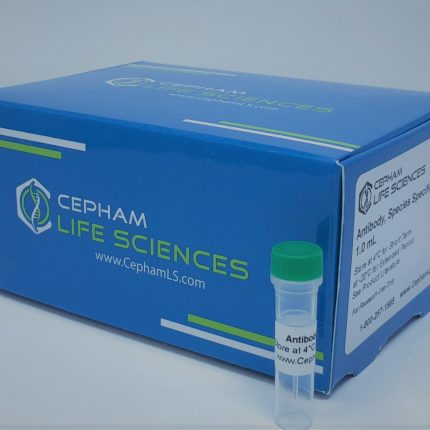Aliases
EC 2.7.11.1; MST-1; Mammalian STE20-like protein kinase 1; STE20-like kinase MST1; STK4; Serine/threonine protein kinase 4; Serine/threonine protein kinase Krs-2; kinase MST1; serine/threonine kinase 4; STE20-like kinase MST1; Yeast Sps1/Ste20-related kin
Antibody Type
Polyclonal Antibody
Uniprot ID
Swiss-Prot#:Q13043;
NCBI Gene#:6789
Immunogen
Peptide sequence around phosphorylation site of threonine 183 (R-N-T(p)-V-I) derived from Human Mst1/2.
Raised In
Rabbit
Species Reactivity
Human Mouse
Tested Applications
WB IHC Recommended dilution: Western blotting: 1:500~1:3000, Immunohistochemistry: 1:50~1:100,
Background / Function
Stress-activated, pro-apoptotic kinase which, following caspase-cleavage, enters the nucleus and induces chromatin condensation followed by internucleosomal DNA fragmentation. Key component of the Hippo signaling pathway which plays a pivotal role in organ size control and tumor suppression by restricting proliferation and promoting apoptosis. The core of this pathway is composed of a kinase cascade wherein STK3/MST2 and STK4/MST1, in complex with its regulatory protein SAV1, phosphorylates and activates LATS1/2 in complex with its regulatory protein MOB1, which in turn phosphorylates and inactivates YAP1 oncoprotein and WWTR1/TAZ. Phosphorylation of YAP1 by LATS2 inhibits its translocation into the nucleus to regulate cellular genes important for cell proliferation, cell death, and cell migration. STK3/MST2 and STK4/MST1 are required to repress proliferation of mature hepatocytes, to prevent activation of facultative adult liver stem cells (oval cells), and to inhibit tumor formation By similarity.
Conjugate
Unconjugated
Storage Buffer
Rabbit IgG in phosphate buffered saline (without Mg2+ and Ca2+), pH 7.4, 150mM NaCl, 0.02% sodium azide and 50% glycerol.
Form
liquid
Storage
Shipped at 4°C. Upon delivery aliquot and store at -20°C or -80°C. Avoid repeated freeze.
Purity
Antibodies were produced by immunizing rabbits with synthetic phosphopeptide and KLH conjugates. Antibodies were purified by affinity-chromatography using epitope-specific phosphopeptide. Non-phospho specific antibodies were removed by chromatogramphy using non-phosphopeptide.
Modification
Phospho-Thr183







